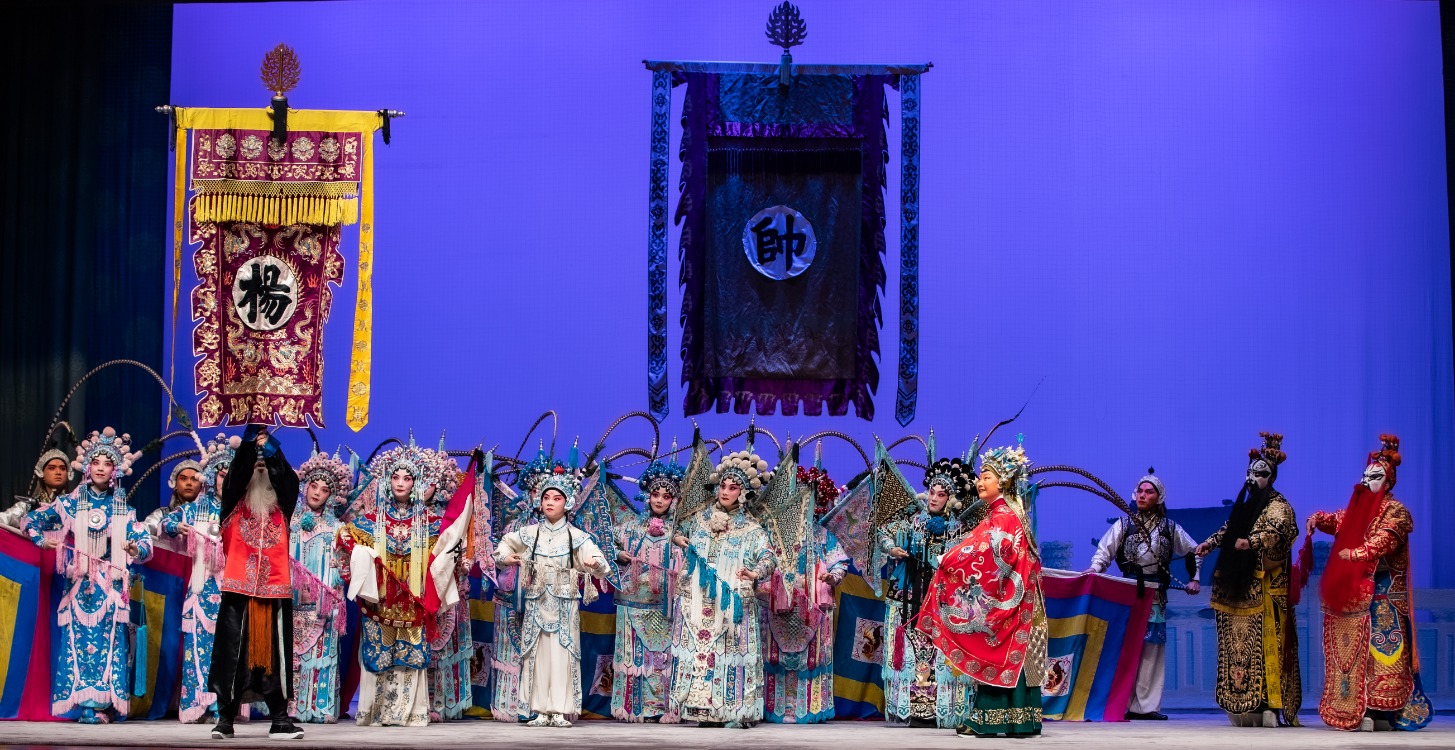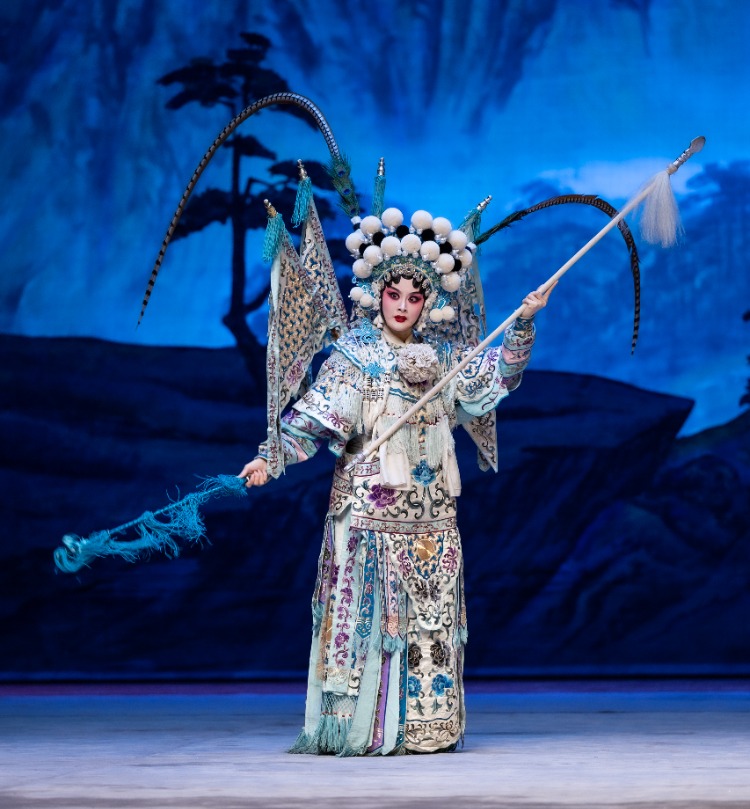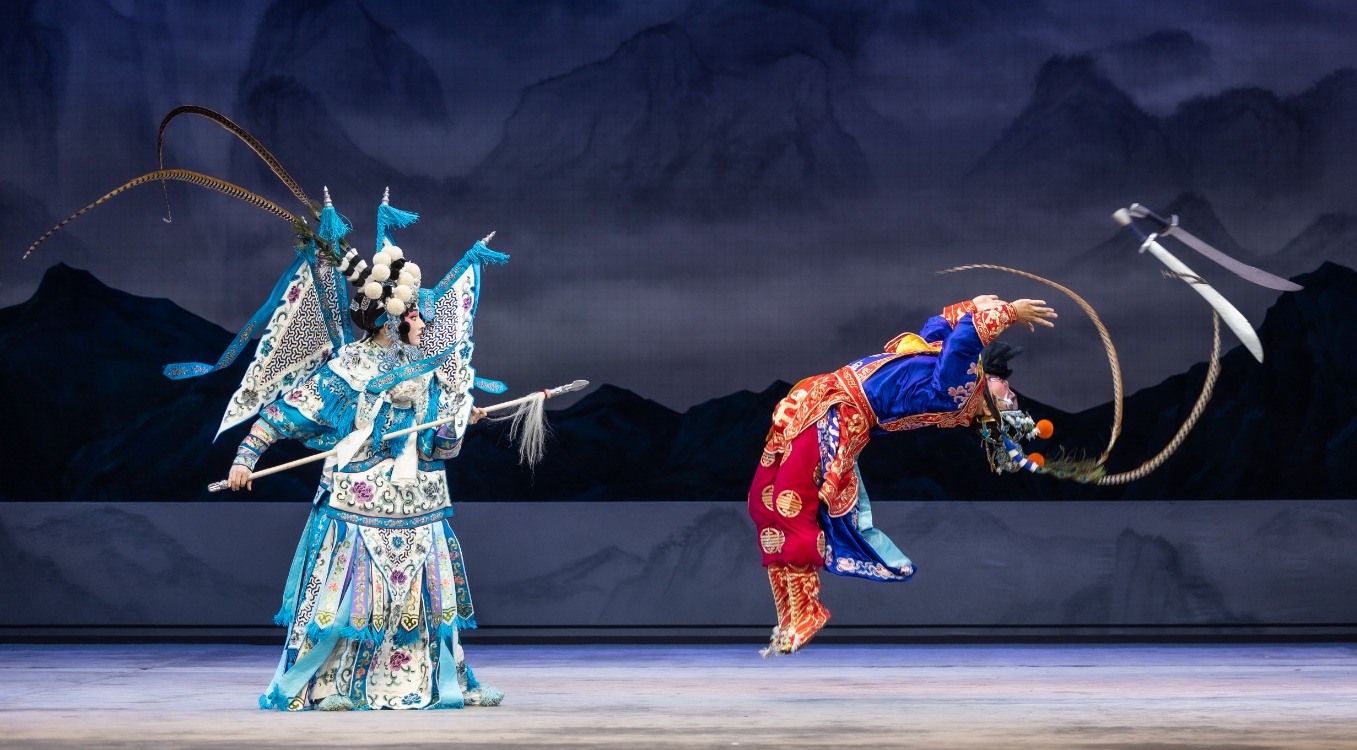
After 68 years, the China National Peking Opera Company has returned to Latin America with four shows, a workshop and an array of cultural exchange programs in Brazil to promote the rich legacy of a traditional Chinese art form that boasts a history of more than 200 years.
The last time the company visited Latin America was in 1956, when it toured Chile, Uruguay and Argentina along with Brazil.
This year's tour, which started on Friday and runs through Thursday, covers the Brazilian capital of Brasilia and the cities of Rio de Janeiro and Sao Paulo. The 44-member delegation, led by Wei Liyun, the company's Party secretary, aims to reintroduce Brazilian audiences to the highly stylized artistry of Peking Opera, which combines music, dance, drama, acrobatics and martial arts.
"The tour not only seeks to share the beauty of this traditional art form, but also serves as a cultural exchange initiative, celebrating the themes of loyalty, heroism and love. We hope to build connections with new audiences and inspire an appreciation for the distinctive aesthetics and emotional depth of Peking Opera," Wei said.
Peking Opera, also known as jingju in Chinese, can be traced to 1790 but formally began taking shape in 1840, growing rapidly during the reign of Empress Dowager Cixi (1835-1908), a fan of Chinese opera.
Thereafter, the art form went from strength to strength, with troupes being formed in Beijing, Tianjin and Shanghai. In 2010, it was declared an Intangible Cultural Heritage of Humanity by UNESCO.

Star performers of Peking Opera have been popularizing the art form across the country as well as abroad. One of the best-known Peking Opera masters was Mei Lanfang (1894-1961), who performed in nandan style, or a male actor playing a female role. He was the first actor to present Peking Opera outside China, touring the United States in 1930.
One of the shows being staged during this year's Brazil tour is the classic piece San Cha Kou, or At The Crossroads, which follows Ren Tanghui, a warrior escorting Jiao Zan, a Song Dynasty (960-1279) general, on his way to exile after Jiao was framed for a crime.
Both Ren and Jiao spend the night at an inn owned by Liu Lihua, who mistakes Ren for an assassin sent to murder Jiao. At the same time, Ren has a similar suspicion about Liu. In darkness, they fight fiercely.
ALSO READ: Peeking deeper into famed Peking Opera performer's life
Zhu Lingyu, a young, talented and diligent wusheng, or male martial arts performer, said this piece showcases the traditional "virtual" performance style, where actors vividly depict actions such as navigating darkness through choreographed movements. The fight scenes are a visual highlight, with seamless flips and acrobatic moves demonstrating the agility of the actors.
"When people go to watch a Peking Opera show, they expect to witness a show like no other and they never walk away disappointed," Zhu said. "It is the first time I am traveling with the company to perform in Brazil, a beautiful country. I am very excited to see the reaction of the audiences, many of whom may have never watched or heard of Peking Opera."
This sophisticated art form is the essence of Chinese culture, which shows traditional Chinese values such as loyalty, modesty and honesty, Zhu said.
"Even for professional performers, who spent years learning and practicing, the art form is much more than the primary appeal of brilliant costumes and jaw-dropping skills," Zhu added.
For Peking Opera actress Jiang Meiyi, it will also be her first time performing in Brazil. She will play the leading role of Mu Guiying, a female warrior in the play Female Generals of the Yang Family. It is a tale about the legendary female warriors of the Yang family defending their nation in a time of peril.

"We are presenting a youth revival edition, emphasizing the patriotic spirit of the female warriors of the Yang family, combining powerful music, dramatic storytelling and visually arresting battle scenes," Jiang said.
Mu Guiying is a household name in China. She was the leading character in Peking Opera master Mei's last stage appearance in 1959.
"We have held a series of events to guide the audiences in Brazil to better understand Peking Opera," Jiang said. "Female Generals of the Yang Family is themed on courage, loyalty and sacrifice, which is resonating well with the audiences.
"The combination of martial arts, acrobatics and expressive singing is captivating the audiences, along with the elaborate makeup, costumes and stage decor, creating a visually stunning experience," Jiang said, adding that the struggles and triumphs of the characters always evoke strong emotional responses.
Another play, Goddess Scattering Flowers, once a staple in the repertoire of Peking Opera master Mei, is noted for its elegant dance sequences and lyrical singing, evoking the graceful movements of a celestial being.
Peking Opera actress Guo Xiao has been trained to keep the performing style created by Mei. "Unlike Peking Opera pieces with stunning marital art scenes, Goddess Scattering Flowers is known for its fluid structure and musical arrangement, which reflects the beauty of the goddess' journey through the clouds," Guo said.
READ MORE: Chinese opera festival: Opening tradition up to today
"It features intricate choreography, expressive singing and beautiful costumes, showcasing Mei Lanfang's exceptional talent in portraying female roles. The theme of love, beauty and nature is prominent," she added.


